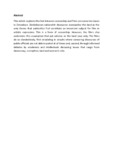Please use this identifier to cite or link to this item:
https://cris.library.msu.ac.zw//handle/11408/1491Full metadata record
| DC Field | Value | Language |
|---|---|---|
| dc.contributor.author | Rwafa, Urther | - |
| dc.date.accessioned | 2016-05-31T08:30:03Z | - |
| dc.date.available | 2016-05-31T08:30:03Z | - |
| dc.date.issued | 2012 | - |
| dc.identifier.issn | 2078-9785 | - |
| dc.identifier.uri | http://hdl.handle.net/11408/1491 | - |
| dc.description.abstract | This article explores the link between censorship and films on economic issues in Zimbabwe. Zimbabwean nationalist discourses monopolise the land as the only theme that authorities feel constitute an important subject for film or artistic expression. This is a form of censorship. However, the films also undermine this assumption that put salience on the land issue only. The films do so clandestinely, first circulating in circuits where censoring discourses of public officials are not able to patrol at all times and, second, through informed debates by academics and intellectuals discussing issues that range from democracy, corruption, land and women’s role. | en_US |
| dc.language.iso | en | en_US |
| dc.publisher | Unisa Press | en_US |
| dc.relation.ispartofseries | In Imbizo, International Journal of African Literary and Comparative Studies;Vol 3.No. 2 | - |
| dc.subject | Censorship | en_US |
| dc.subject | Economic Film | en_US |
| dc.subject | Land | en_US |
| dc.subject | Zimbawe | en_US |
| dc.title | Censorship and economic film in Zimbabwe | en_US |
| dc.type | Article | en_US |
| item.fulltext | With Fulltext | - |
| item.openairecristype | http://purl.org/coar/resource_type/c_18cf | - |
| item.languageiso639-1 | en | - |
| item.cerifentitytype | Publications | - |
| item.grantfulltext | open | - |
| item.openairetype | Article | - |
| Appears in Collections: | Research Papers | |
Files in This Item:
| File | Description | Size | Format | |
|---|---|---|---|---|
| Abstract Censorship.pdf | 267.56 kB | Adobe PDF |  View/Open |
Page view(s)
130
checked on Jan 19, 2026
Download(s)
24
checked on Jan 19, 2026
Google ScholarTM
Check
Items in MSUIR are protected by copyright, with all rights reserved, unless otherwise indicated.



